Artificial Intelligence (AI) has taken the world by storm. Almost every industry across the globe is incorporating AI for a variety of applications and use cases. Some of its wide range of applications includes process automation, predictive analysis, fraud detection, improving customer experience, etc. You can start by reading the Top Artificial Intelligence Books for self-learning to learn about AI and its concepts. You can also upskill with various Artificial Intelligence Courses available.
AI is being foreseen as the future of technological and economic development. As a result, the career opportunities for AI engineers and programmers are bound to increase drastically in the next few years. Suppose you have no prior knowledge about AI but are very interested in learning and starting a career in this field. In that case, the following ten Books on Artificial Intelligence will be quite helpful:
Here is the list of top Artificial Intelligence Books for Beginners
Artificial Intelligence – A Modern Approach (3rd Edition)
– By Stuart Russell & Peter Norvig

This book on artificial intelligence has been considered by many as one of the best AI books for beginners. It is less technical and gives an overview of the various topics revolving around AI. The writing is simple, and the reader can easily understand all concepts and explanations.
The concepts covered include subjects such as search algorithms, game theory, multi-agent systems, statistical Natural Language Processing, local search planning methods, etc. The book also touches upon advanced AI topics without going in-depth. Overall, it’s a must-have book for anyone who wants to learn about AI.
Machine Learning for Dummies
– By John Paul Mueller and Luca Massaron

Machine Learning for Dummies provides an entry point for anyone looking to get a foothold on Machine Learning. It covers all the basic concepts and theories of machine learning and how they apply to the real world. It introduces a little coding in Python and R to teach machines to perform data analysis and pattern-oriented tasks.
From small tasks and patterns, the readers can extrapolate the usefulness of machine learning through internet ads, web searches, fraud detection, and so on. Authored by two data science experts, this Artificial Intelligence book makes it easy for any layman to understand and implement machine learning seamlessly.
Artificial Intelligence and Machine Learning
– By Vinod Chandra S. S.

The primary audience for this book is computer science and engineering undergraduate and graduate students. The book uncovers the gap between the challenging environments of artificial intelligence and machine learning. All the concepts are explained with the help of case studies and worked-out examples.
It also encompasses other forms of learning like reinforcement, supervised, unsupervised, statistical learning, artificial intelligence, and machine learning. Each topic includes well-explained algorithms and pseudo-codes, which makes the book very helpful for beginners who aspire to kickstart their careers in AI.
Make Your Own Neural Network
– By Tariq Rashid

One of the books on artificial intelligence provides its readers with a step-by-step journey through the mathematics of Neural Networks. It starts with very simple ideas and gradually builds up an understanding of how neural networks work. Using Python language, it encourages its readers to build their own neural networks.
The book is divided into three parts. The first part deals with the various mathematical ideas underlying neural networks. Part 2 is practical, where readers are taught Python and are encouraged to create their own neural networks. The third part gives a peek into the mysterious mind of a neural network. It also guides the reader to get the codes working on a Raspberry Pi.
Machine Learning: The New AI
– By Ethem Alpaydin

Machine Learning: The New AI gives a concise overview of machine learning. It describes its evolution, explains important learning algorithms, and presents example applications. It explains how digital technology has advanced from number-crunching machines to mobile devices, putting today’s machine learning boom in context.
The book on artificial intelligence gives examples of how machine learning is being used in our day-to-day lives and how it has infiltrated our daily existence. It also discusses the future of machine learning and the ethical and legal implications for data privacy and security. Any reader with a non-Computer Science background will find this book interesting and easy to understand.
Fundamentals of Machine Learning for Predictive Data Analytics: Algorithms, Worked Examples, and Case Studies
– By John D. Kelleher, Brian Mac Namee, Aoife D’Arcy

This AI Book covers all machine learning fundamentals, practical applications, working examples, and case studies. It gives detailed descriptions of important machine learning approaches used in predictive analytics.
Four main approaches are explained in very simple terms without using much technical jargon. Each approach is described using algorithms and mathematical models illustrated by detailed examples. The book is suitable for those with basic computer science, engineering, mathematics, or statistics background.
The Hundred-Page Machine Learning Book
– By Andriy Burkov

Andriy Burkov’s “The Hundred-Page Machine Learning Book” is regarded by many industry experts as the best book on machine learning. For newcomers, it gives a thorough introduction to the fundamentals of machine learning. For experienced professionals, it gives practical recommendations from the author’s rich AI field experience.
The book covers all major approaches to machine learning. They range from classical linear and logistic regression to modern support vector machines, boosting, Deep Learning, and random forests. This book is perfect for those beginners who want to get familiar with the mathematics behind machine learning algorithms.
Artificial Intelligence for Humans
– By Jeff Heaton

This book helps its readers get an overview and understanding of AI algorithms. It is meant to teach AI to those who don’t have an extensive mathematical background. The readers need to have only a basic knowledge of computer programming and college algebra.
Fundamental AI algorithms such as linear regression, clustering, dimensionality, and distance metrics are covered in depth. The algorithms are explained using numeric calculations, which the readers can perform themselves and through interesting examples and use cases.
Machine Learning for Beginners
– By Chris Sebastian

As per its title, Machine Learning for Beginners is meant for absolute beginners. It traces the history of the early days of machine learning to what it has become today. It describes how big data is important for machine learning and how programmers use it to develop learning algorithms. Concepts such as AI, neural networks, swarm intelligence, etc., are explained in detail.
This Artificial Intelligence book provides simple examples for the reader to understand the complex math and probability statistics underlying machine learning. It also provides real-world scenarios of how machine learning algorithms improve our lives.
Artificial Intelligence: The Basics
– By Kevin Warwick

This book provides a basic overview of different AI aspects and the various methods of implementing them. It explores the history of AI, its present, and where it will be in the future. The book has interesting depictions of modern AI technology and robotics. It also gives recommendations for other books that have more details about a particular concept.
The book is a quick read for anyone interested in AI. It explores issues at the heart of the subject and provides an illuminating experience for the reader.
Machine Learning for Absolute Beginners: A Plain English Introduction
– By Oliver Theobald

One of the few artificial intelligence books that explain the various theoretical and practical aspects of machine learning techniques very simply. It makes use of plain English to prevent beginners from being overwhelmed by technical jargon. It has clear and accessible explanations with visual examples
Apart from learning the technology itself for business applications, there are other aspects of AI that enthusiasts should know about, including philosophical, sociological, ethical, humanitarian, and other concepts.
Here are some of the books that will help you understand other aspects of AI for a larger picture and also help you indulge in intelligent discussions with peers.
Applied Artificial Intelligence: A Handbook for Business Leaders

By– Mariya Yao, Adelyn Zhou, Marlene Jia
Applied Artificial Intelligence is a helpful handbook for business professionals who are enthusiastic about utilizing artificial intelligence to improve their company’s efficiency and the overall standard of living in their societies.
This book focuses on using machine learning and artificial intelligence to make practical and strategic business decisions. It is one of the best practical AI books available for company executives wishing to truly benefit from using Machine Learning Technology.
Advances in Financial Machine Learning
By– Marcos Lopez de Prado

This book talks about how one can structure Big Data so that Machine Language Algorithms can work on it, how to leverage supercomputing techniques, how to perform research on that data using ML algorithms, and how to backtest findings while minimizing false positives.
The book identifies practical issues that professionals experience on a regular basis and provides mathematical explanations of scientifically sound solutions, accompanied by code and real-world examples.
Philosophical books
Superintelligence: Paths, Dangers, Strategies
– By Nick Bostrom

Recommended by both Elon Musk and Bill Gates, the book talks about steering the course through the unknown terrain of AI. The author of this book, Nick Bostrom, is a Swedish-born philosopher and polymath. His background and experience in computational neuroscience and AI
Life 3.0
– By Max Tegmark
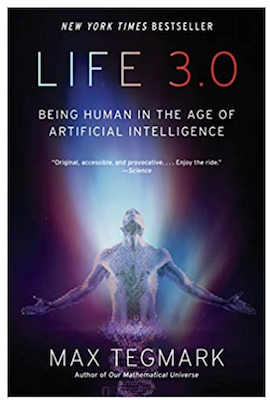
This AI book by Max Tegmark will surely inspire anyone to dive deeper into the field of Artificial Intelligence. It covers the larger issues and aspects of AI,
Sociological Books
The Singularity Is Near
– By Ray Kurzweil
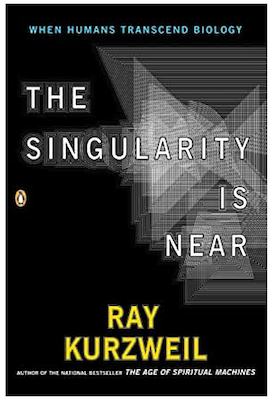
Ray Kurzweil was called ‘restless genius’ by the Wall Street Journal and was also highly praised by Bill Gates. He is a leading inventor, thinker, and futurist who takes a keen interest in the field of Artificial Intelligence. In this AI book, he talks about the aspect of AI which is most feared by many of us, i.e., ‘Singularity’. He talks extensively about the union of humans and machines.
The Sentiment Machine
– By Amir Husain

This book challenges us about societal norms and the assumptions of a ‘good life’. Amir Husain, being the brilliant computer scientist he is, points out that the age of Artificial Intelligence is the dawn of a new kind of intellectual diversity. He guides us through the ways we can embrace AI in our lives for a better tomorrow.
The Society of Mind
– By Marvin Minsky
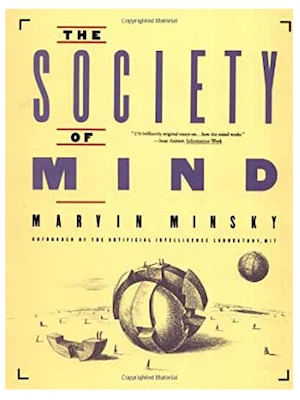
Marvin Minsky is the co-founder of the AI Laboratory at MIT and has authored a number of great Artificial Intelligence Books. One such book is ‘The Society of Mind’, which portrays the mind as a society of tiny components. This is the ideal book for all those who are interested in exploring intelligence and the aspects of the mind in the age of AI.
Humanitarian Books
The Emotion Machine
– By Marvin Minsky
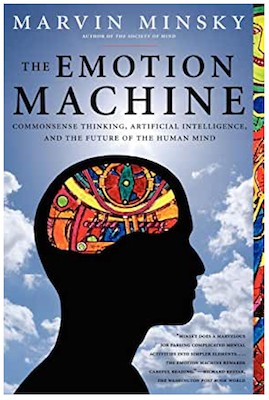
In this book, Marvin Minsky presents a novel and a fascinating model of how the human mind works. He also argues that machines with a conscious can be built to assist humans with their thinking processes. In his book, he presents emotion as another way of thinking. It is a great follow-up to the book “Society Of Mind”.
Human Compatible – Artificial Intelligence and the Problem of Control
– By Stuart Russell
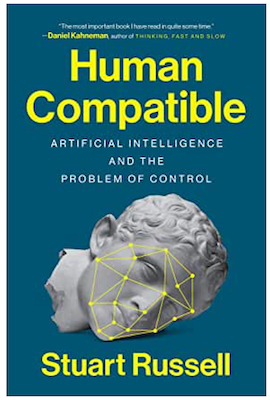
The AI researcher Stuart Russell explains the probable misuse of Artificial Intelligence and its near-term benefits. It is an optimistic and empathetic take on the journey of humanity in this day and age of AI. The author also talks about the need for rebuilding AI on a new foundation where the machine can be built for humanity and its objectives.





0 Comments